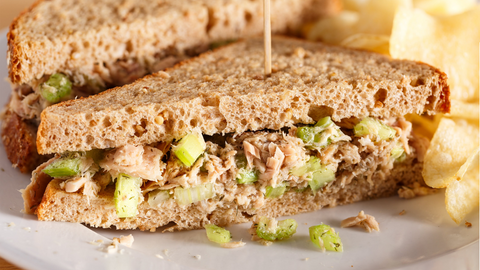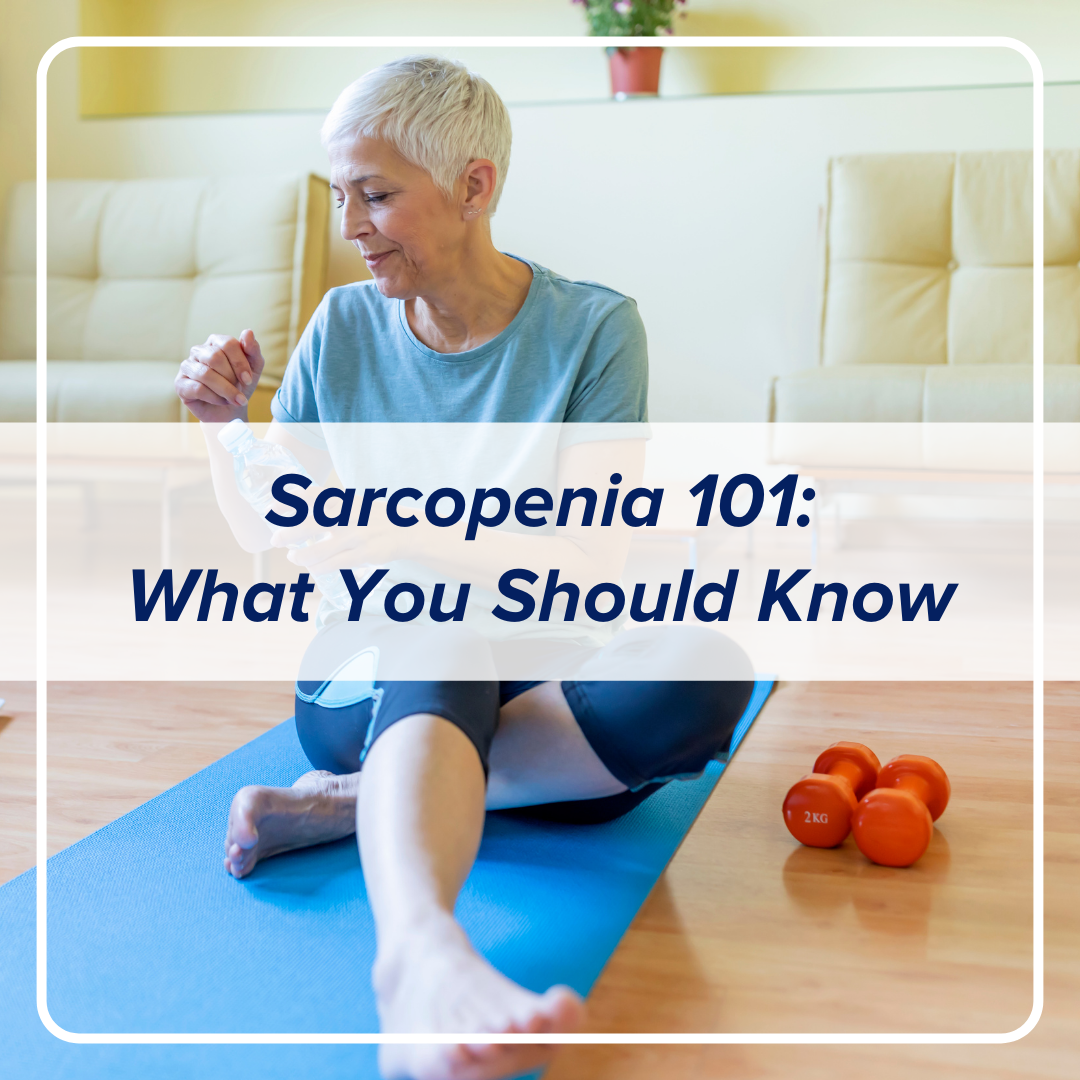Sarcopenia is the type of condition that you may only hear about when it becomes too late. While not commonly talked about, it can have a significant impact on your daily activities, quality of life, and life expectancy rate.
The good news? There are preventative measures you can take today to help reverse and treat it!
What is sarcopenia?
Sarcopenia is the age-related loss of muscle mass, strength, and function.2 It leads to weakness and decreased activity, which further contributes to loss of muscle mass. On average, adults lose 3% of their muscle strength every year, which can begin as early as the age of 30!

What causes sarcopenia?
There are several main causes of sarcopenia, and those who suffer from obesity, diabetes and low levels of vitamin D are more susceptible to it. The most common factors that contribute to the loss of muscle mass include an inactive lifestyle, unbalanced diet, inflammation from chronic or long-term illnesses, and stress.3
Sarcopenia and exercise
You can help prevent and treat sarcopenia by turning everyday errands and chores into strength-building activities. These can include: cleaning the house, carrying groceries, playing with the kids, taking the stairs, parking further away during errands, gardening etc. Combine aerobic activity (walking, jogging, biking, swimming) with strength training (i.e. push-ups, pull-ups, sit-ups, lifting weights and using resistance bands) a few days a week to keep your muscles active.3 Not only does exercise help with cardiovascular health, but it can also help reduce stress and improve sleep!
Sarcopenia and diet
Diet also plays an important role in prevention and treatment of sarcopenia. Ensuring you get adequate protein, vitamin D, and omega-3 fatty acids every day is crucial to maintaining strength and preventing frailty.
-
Protein: a macronutrient made up of building blocks called amino acids. Protein makes up our muscles, bones, hair, skin, and nails, helps our organs function properly, and is key to building muscle and supporting immunity. You should aim to incorporate protein during each meal of the day, and even in snacks.
Protein-rich foods: Eggs, peanut butter, cottage cheese, greek yogurt, nuts, tuna, chicken or other animal protein choice. Plant-based protein sources include: tofu, lentils, quinoa, chickpeas, nutritional yeast, and edamame.
Especially for older adults who may begin experiencing appetite loss, dental issues, and digestive and metabolic changes, it may be difficult to achieve the recommended protein intake with regular meals alone. Incorporating a high-quality protein supplement that contains all of the essential amino acids often helps to bridge the gap in a person’s ability to consume enough protein.
-
Vitamin D: A fat-soluble vitamin that aids in the absorption of calcium in the gut, Vitamin D assists with bone formation, reduces inflammation, helps with immune cell growth, and helps maintain and improve muscle strength, function and physical performance in older adults.5 Vitamin D is a key factor in the prevention of sarcopenia.
Foods high in vitamin D: Eggs, fatty fish (i.e. salmon, sardines, mackerel, and tuna) fortified milk, juices and cereals. Vitamin D supplements are a great option if these foods are not regularly incorporated in your diet.
-
Omega-3 fatty acids: Research suggests that Omega 3 may help with muscle growth and increased muscular strength. This is likely due to the anti-inflammatory benefits and its ability to signal muscle growth directly. 3
Foods high in omega-3’s: Nuts and seeds (flaxseed, chia seeds, walnuts, peanut nutter), dairy and juices fortified with omega-3’s, breads and pastas that contain omega-3’s (cereal, oatmeal, flour tortillas), brussel sprouts, kale, spinach, broccoli, cauliflower. Omega-3 supplements such as fish oil, krill oil, cod liver oil and algal oil may be appropriate if unable to get enough omega-3’s through diet alone.
High-protein meal suggestions
Breakfast:
2 eggs + whole wheat English muffin + 1 slice Canadian bacon + 1 small apple + 6oz pineapple juice.

Tip: Add a shot of VidaFuel Wellness Protein to your juice for an extra 16g of complete protein!
Lunch:
2 slices of whole wheat bread + 4oz tuna salad + carrot sticks + 2 tbsp plain hummus + 1 small pear + 1/2 cup plain animal crackers

Dinner:
4oz grilled salmon + 1/2 cup pasta with olive oil + 1/2 cup broccoli + 1 small dinner roll
Getting enough calories and protein every day and making time to exercise will help fight the natural process of decreased muscle mass with aging. Make sure to speak with your dietitian if you have any specific questions about your caloric or nutrition needs.
Vidafuel Wellness Protein Drinks
Our dietitian-developed, high-quality protein drinks are easily digestible for those looking for quick ways to incorporate more complete protein into their diet. The Wellness Protein Drink is a blend of whey and high-quality collagen protein, and contains no artificial colors or sweeteners. It contains 16g of complete protein (meaning it contains all 9 essential amino acids) per 2oz serving (equivalent to ¼ cup).
Our Wellness Protein Drink is available in two fruit-packed flavors: Citrus Burst or Berry Delight. The serving size is so small that you can take it on its own, or add it to a smoothie, yogurt and jello snacks, or add it into morning pancakes.
References:
- Volpi E, Nazemi R, Fujita S. Muscle tissue changes with aging. Curr Opin Clin Nutr Metab Care. 2004;7(4):405-410. doi:10.1097/01.mco.0000134362.76653.b2
- Wellman, Nancy S & Kamp, Barbara J. Nutrition in Aging. In: Mahan & Stump, ed Krause’s Food & Nutrition Therapy. 12th edition. St Lois, MO. Saunders Elsevier. 2008: 286-291.
- How to Fight Sarcopenia (Muscle Loss Due to Aging). Healthline Media Website. Accessed January 5, 2021. Updated 2020. https://www.healthline.com/nutrition/sarcopenia
- Santilli V, Bernetti A, Mangone M, Paoloni M. Clinical definition of sarcopenia. Clin Cases Miner Bone Metab. 2014;11(3):177-180.
- Remelli F, Vitali A, Zurlo A, Volpato S. Vitamin D Deficiency and Sarcopenia in Older Persons. Nutrients. 2019;11(12):2861. Published 2019 Nov 21. doi:10.3390/nu11122861
- Oikawa, S. Y., MSc, & Torres-Gonzalez, M., PhD. (2020, January). The Impact of Protein Quality on Muscle Recovery. Retrieved January 08, 2021, from https://www.todaysgeriatricmedicine.com/archive/JF20p14.shtml


